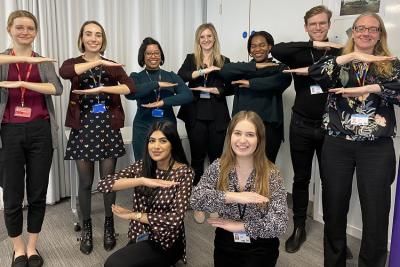Each for equal: building a more inclusive workforce
‘An equal world is an enabled world’ is the theme leading International Women’s Day celebrations this year.
At Ofgem, we’ve thought about this a lot. We recognise that to do our work well, and understand and respond to the issues we need to, we must be representative of the people we serve.
This isn’t just a corporate mantra. It’s resulted in our first ever Diversity and Inclusion Strategy, the launch of our ambitious diversity networks and resulting initiatives including our POWERful Women Pledge and recent Power in Pride Promise.
It’s also why I have the dedicated ‘diversity and inclusion’ role I do today. We don’t see equality as just a women’s issue, or indeed just a diversity issue – it’s a business issue.
So how far have we come?
Among our strategy commitments, last year we set out to reach at minimum across all levels of Ofgem:
- 50% representation from women by 2025
- 18% representation from Black, Asian and Minority Ethnic (BAME) communities in senior roles by 2025, with at least 9% at each grade being BAME women
A year-on, I’m pleased to share our progress so far. Our proportion of women at senior civil servant level now stands at 44% (up from 33%). We have introduced anonymised recruitment alongside targeted guidance and training to help reduce unconscious bias, so we are recruiting the most talented people irrespective of personal characteristics. Our Women’s Network has been shortlisted for a gender equality award within the Civil Service too. This acknowledges progressive work in areas such as championing parental leave and improvements in maternity leave, and raising awareness of issues through groups like POWERful Women and others to ignite the change needed to better representation in the energy sector. We will report more fully later this year.
We don’t see equality as just a women’s issue, or indeed just a diversity issue – it’s a business issue.
All these things make a difference. But we are at the beginning of our journey. From the data we hold, we know that there is a double disadvantage to address for particular groups of staff, such as our ethnic minority women or disabled staff with poor mental health. Working with our Embrace BAME network, and Women's Network, we are also examining our gender and pay gaps in more detail so we can set meaningful targets.
Industry has far to go too – only 16% of UK Energy company board positions are currently held by women, reducing to 6% of non-executive director positions. We still lag behind other sectors of the economy.
Of course, targets are not in themselves enough, but each holds us to account in pushing for equality – to cultivate an environment that increases engagement, in which everyone belongs and where we can collectively benefit from the dividends of diversity that research increasingly points us to.
I joined Ofgem just a few months ago, having spent the last decade focusing on diversity and inclusion in Science, Technology, Engineering and Maths (‘STEM’). I see commonalities in the energy sector. Energy, like STEM, pervades every part of our lives – the economy, our wellbeing, future choices and opportunities. Additionally, none of us is one type of consumer.
In this context, as we strive to protect people today and build the energy system of tomorrow, we must signal that it’s the individual conversations, perspectives and mindsets making up collective society that matter. Ultimately, it’s this balance of voices that will enable us to make the positive difference that is our duty.
An equal world is an enabled one.
